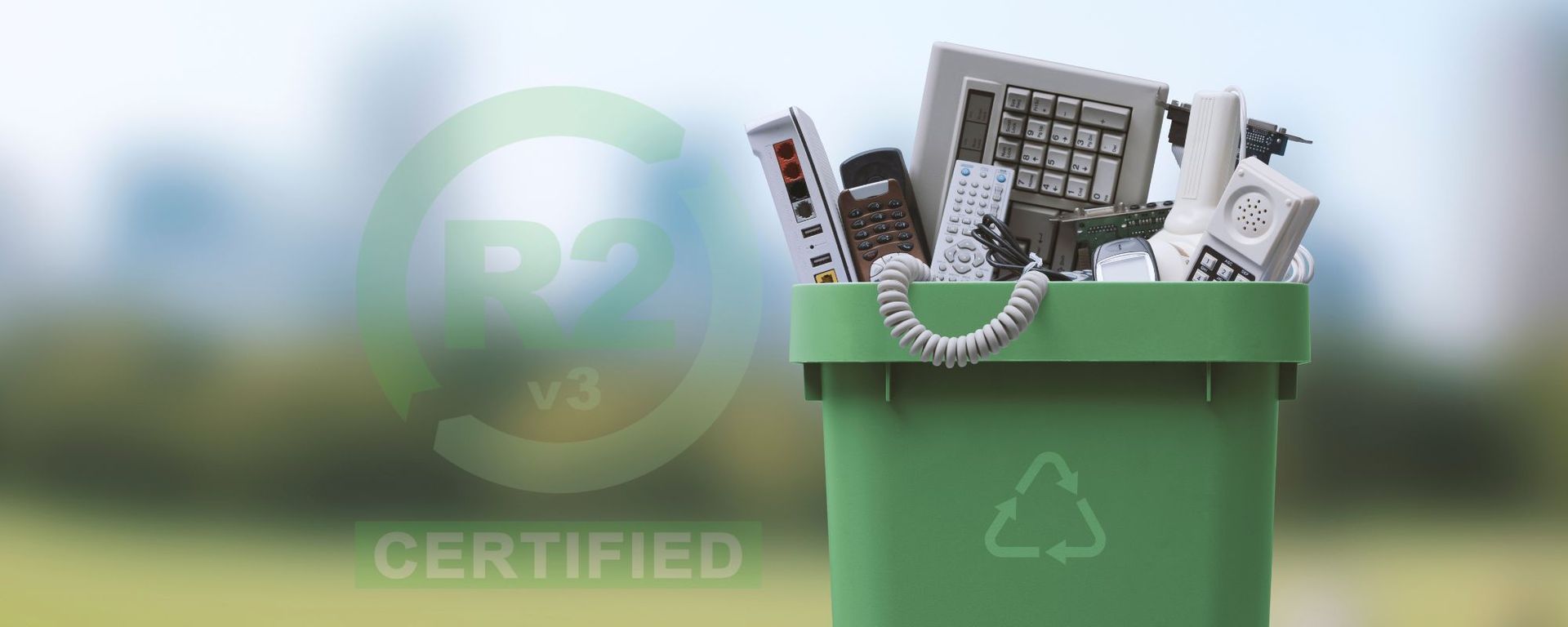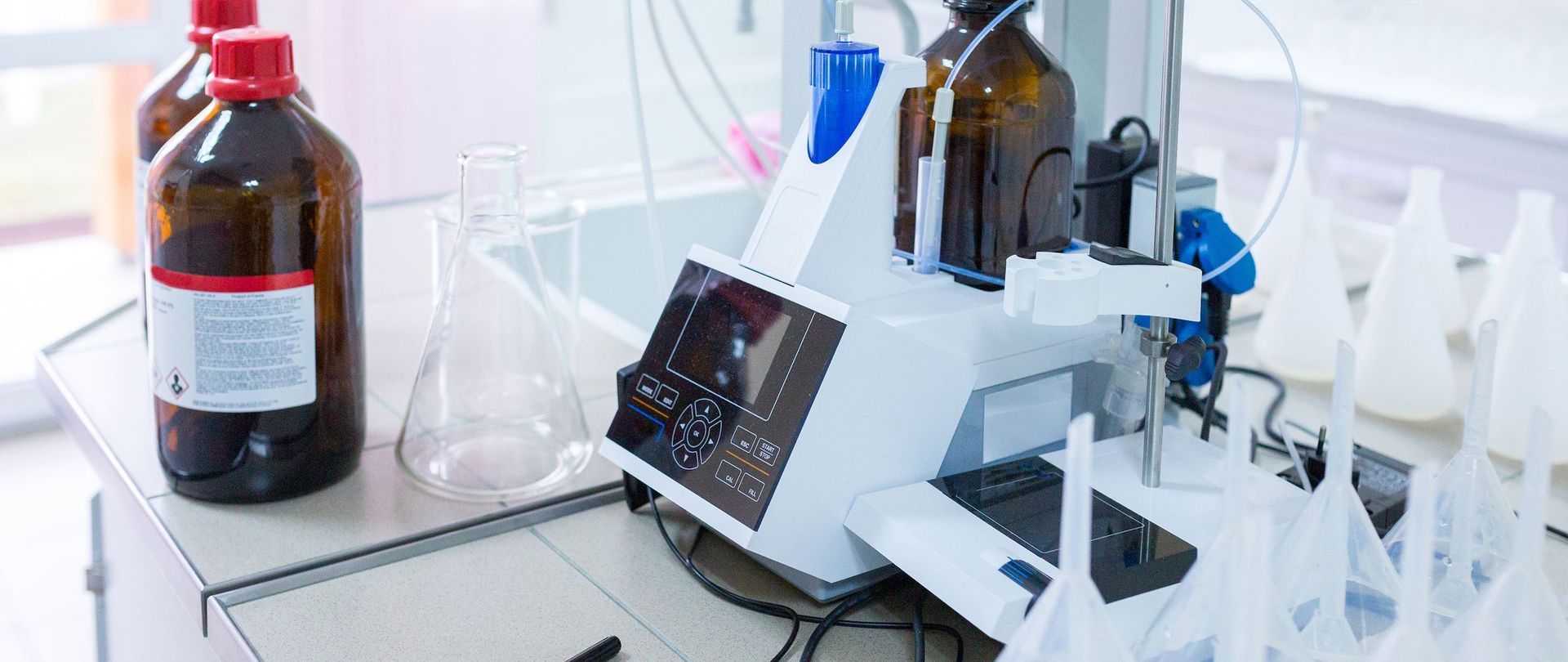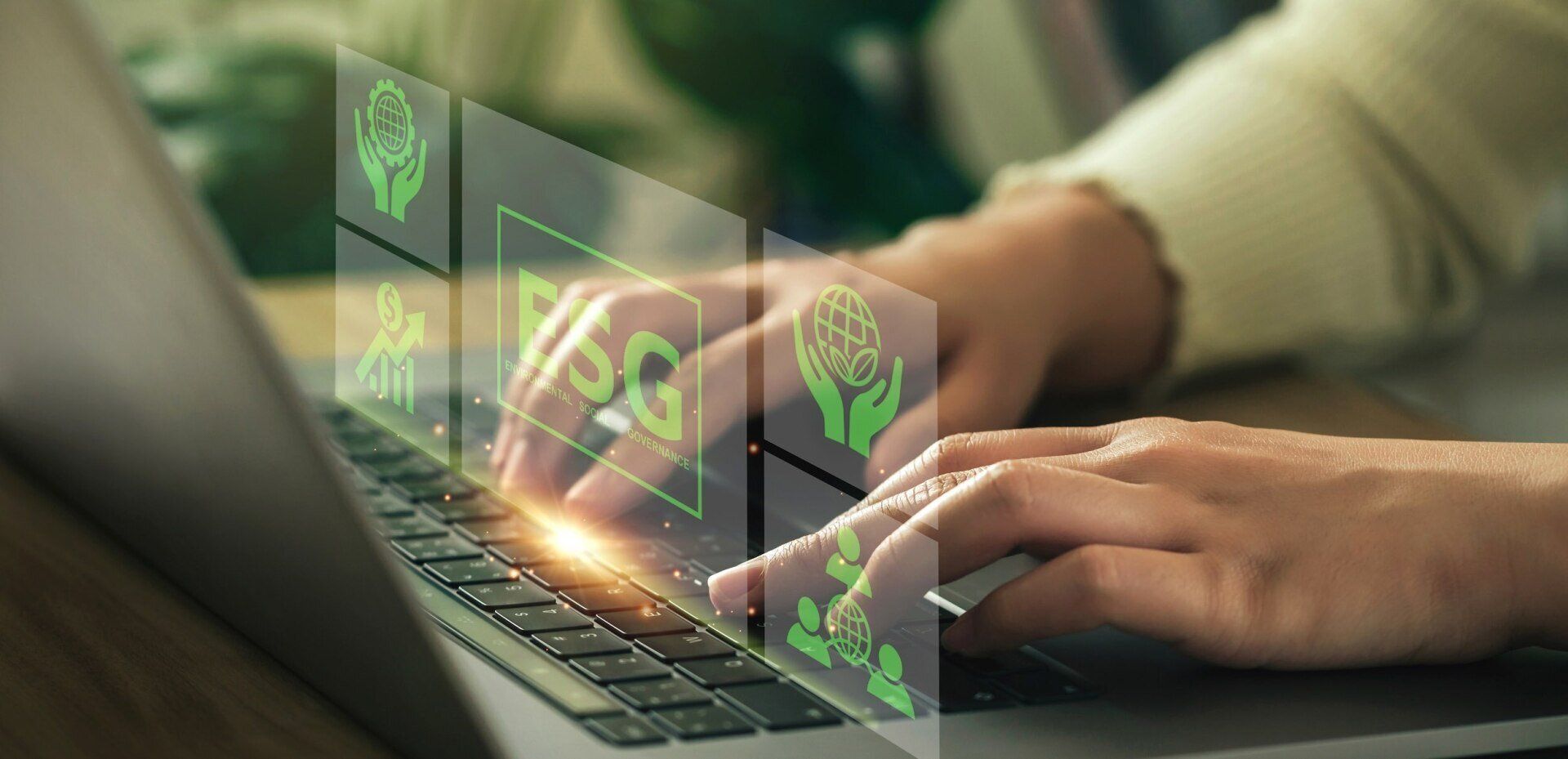R2 Certification and R2v3 Certification - Promoting Reuse and Recycle
R2 Certification and R2v3 Certification - promoting reuse and recycling
What are R2 and R2v3 Certifications for End-of-Life Electronics Recycling?
R2 (Responsible Recycling) and R2v3 (R2 Version 3) are certifications for electronics recycling organizations that adhere to responsible and sustainable practices.
The R2 Certification is a leading industry standard developed by SERI (Sustainable Electronics Recycling International) to ensure the safe and environmentally responsible management of electronic waste. It covers various aspects of the recycling process, including data security, worker health and safety, downstream recycling chain management, and environmental protection.
R2 stands for Responsible Recycling and is a standard specifically created for the electronics recycling industry by Sustainable Electronics Recycling International (SERI). SERI is the housing body and ANSI-accredited Standards Development Organization for the R2 Standard: Responsible Recycling Practices for Use in Accredited Certifications Programs.
R2v3 is the latest version of the R2 standard, released in 2020. It encompasses additional requirements to address evolving industry practices and challenges. R2v3 places a greater emphasis on data security and the responsible management of lithium-ion batteries, among other updates.
EPA recommends using certified electronics recyclers to manage unwanted used electronics. Currently, there are two accredited certification standards in the United States and one of those is R2.
These certifications verify that an electronics recycling facility follows strict standards for handling e-waste and avoids harmful practices such as exporting waste to developing countries or disposing of it in landfills.
By choosing R2 or R2v3 certified recyclers, consumers and businesses can be confident that their electronic devices are being recycled in an environmentally and socially responsible manner. Surplus Service is a company that specializes in the responsible and secure disposal of electronic waste.
They offer comprehensive recycling services to businesses and individuals, ensuring that old and unwanted electronics are properly disposed of.

What is the R2 Certification Process?
The Responsible Recycling (R2) certification process entails steps and criteria involved in attaining R2-standard compliance for electronics recyclers worldwide. This certification ensures proper management, recycling, and disposal of electronic waste.
1. Company Evaluation: To start the certification process off on a strong footing, an in-depth examination is undertaken of current practices, documents and compliance with relevant laws and regulations of your organization.
2. Training: Employees receive training on how to comply with and implement procedures required by the R2 Standard in terms of responsible recycling. 3. Documentation: To demonstrate compliance, documents and policies that demonstrate that every provision of the R2 Standard have been fulfilled are developed within the company.
4. Facility Audit: An independent third-party auditor visits your recycling facility to confirm compliance with R2 Standards. They conduct an on-site inspection, review documentation and interview employees to assess whether or not compliance exists.
5. Corrective Actions: Should any non-conformities or opportunities for improvement be identified during an audit, the company must address them and take the necessary corrective actions.
6. Certification Decision: Following an audit, a certification body reviews the auditor's report and makes its certification decision either accepting or declining an R2 certification application.
7. Surveillance Audits: Once certified, periodic surveillance audits must be conducted to monitor compliance with the R2 Standard and remain compliant. Depending on your certification body's guidelines, these may occur annually or as specified.
The above steps offer a general outline of R2 certification process; however, specifics of certification body and local requirements can vary greatly from region to region or country to country.
Surplus Service and R2 Certification/R2v3 Certification
Surplus Service has achieved R2 certification to demonstrate that they meet industry operating standards and ethical recycling practices expected of premium e-waste management companies. Their R2v3 certification covers ITAD/Remarketing/E-Scrap/Recycling for Telecom/Medical/Commercial applications along with Logical Data Erasure as well as Physical Destruction as part of their downstream Recycling Chain Chain; Testing & Repair as well as Speciality Equipment Material Recovery is also covered under their R2 Certificate.
Certification is key when it comes to ethical recycling of electronic equipment, and Surplus Services holds all necessary certifications that make them the ideal partner when searching for someone to recycle your electronics responsibly.
All e-waste is managed with great care in order to meet the highest recycling standards.
Reduce - Reuse - Recycle is our mantra and our goal is to use any available material as much as possible for reuse or recycling to keep landfill waste to an absolute minimum while at the same time helping reduce environmental impacts by recovering material to help lessen energy use, energy consumption and environmental burdens caused by mining/processing of natural resources.
Other Certifications
Our facility also holds ISO certifications.
- ISO 14001
- ISO 45001
ISO 14001 is an internationally-recognized standard for environmental management systems that outlines criteria for developing an effective environmental management program within an organization to identify, monitor and reduce its environmental footprint.
ISO 14001 provides an organization with a framework to design and implement sustainable strategies and protect the environment. It focuses on reducing waste, improving resource efficiency and minimizing its environmental footprint during operations.
The standard provides requirements for creating an environmental policy, conducting environmental risk analyses, setting objectives and targets, implementing operational controls and regularly reviewing performance. It emphasizes continuous improvement and encourages organizations to engage with stakeholders while meeting environmental legislation requirements.
ISO 14001 can be implemented by organizations of any size, sector, and location; it can even be integrated with other management systems like ISO 9001 for quality management.
By adopting ISO 14001, organizations can demonstrate their dedication to environmental responsibility, enhance their reputation and potentially access new markets that value sustainability.
Additionally, the standard can assist organizations in identifying cost-cutting opportunities, increasing employee engagement and mitigating environmental incidents and liabilities.
ISO 14001 was originally released for publication in 1996 and has been regularly revised since then to remain relevant with global environmental trends and challenges. The most current edition is ISO 14001:2015 which emphasizes the integration of environmental management into an organization's strategic planning and decision-making processes.
ISO 45001 is an international standard for occupational health and safety management systems, providing organizations with a framework for identifying, controlling, reducing accidents and increasing overall performance in this area.
ISO 45001 was designed to replace OHSAS 18001, while aligning with other ISO management system standards like ISO 9001 (quality management) and 14001 (environmental management). ISO 45001 takes an emphasis-driven risk-based approach when setting health and safety objectives within organizations.
ISO 45001 sets out the requirements of an effective occupational health and safety management system, such as:
- Context of Organization: Organizations should identify all internal and external factors which could impede their health and safety performance, in this section of ISO 45001.
- Leadership and Worker Participation: It emphasizes the need for strong leadership commitment as well as worker involvement in health and safety matters.
- Planning: Organizations must establish health and safety objectives, create processes to reach them, as well as identify resources and controls necessary for attainment.
- Support: This section covers providing resources, competency development, communication and documentation necessary to support an H&S management system.
- Operation: This section covers requirements for hazard identification, risk evaluation, incident investigations, emergency preparedness planning and control implementation.
- Performance Evaluation: Organizations must monitor and measure their health and safety performance, conduct internal audits, and take corrective actions as necessary.
- Improvement: This section encourages organizations to continually enhance their health and safety performance through data analysis, management reviews, and effective corrective actions.
ISO 45001 provides an effective strategy for managing occupational health and safety risks, complying with legal obligations, and improving worker wellbeing. Implementation of this standard can assist organizations in creating safe work environments while decreasing accidents or illness and building their reputation.
R2v3 Certification
R2v3 certification refers to the latest iteration of Responsible Recycling's (R2) standard for electronics recycling and asset disposition. R2 is internationally-recognized as an environmental, health, safety and data security standard that sets guidelines and requirements for organizations involved with refurbishing, recycling and reselling electronic equipment.
R2v3 Certification signifies that a company or facility has met all criteria set by the R2 standard, as well as undergone an intensive third-party audit process to verify compliance.
This certification highlights our dedication to ethical and sustainable practices within the electronics recycling industry, such as handling hazardous materials safely, safeguarding data security, and adhering to applicable laws and regulations.
By earning R2v3 Certification, organizations can demonstrate credibility, build customer trust, and distinguish themselves as responsible and reliable partners in electronics recycling. R2 certification also has numerous other advantages for electronic recycling businesses.
- Compliance with Legal and Environmental Requirements: R2 certification ensures that electronic recycling facilities comply with all legal regulations related to proper disposal and recycling of electronics waste, helping their organization meet local, state, and federal waste management regulations for environmental protection purposes.
- Environmental Conservation: R2 certification promotes eco-friendly recycling practices that prioritize environmental sustainability. It ensures electronic waste is handled and disposed of safely while also minimizing its effect on the environment.
- Data Security: R2 certification places great emphasis on the safe handling and disposal of electronic data, with emphasis placed on making sure any sensitive information stored on electronic devices is safely erased or destroyed - thus safeguarding both individuals' privacy and organizations' confidentiality.
- Resource Conservation: R2 certification promotes an efficient and effective use of resources when it comes to electronic recycling, encouraging reuse and refurbishing wherever possible in order to decrease raw material and energy-intensive production processes.
- Customer Trust: R2 certification provides assurance to customers and stakeholders that an electronics recycling facility follows best practices for responsible recycling. It builds trust and credibility between clients and recyclers, leading to more business opportunities and customer satisfaction.
- Access to new markets: R2 certification opens up doors to new markets for companies operating globally. Many governments, organizations, and businesses require their electronics recycling partners to hold R2 certification, making it easier to enter these markets successfully and compete.
- Continuous Improvement: R2 certification requires regular audits and assessments to assess compliance with standards, which encourages continual improvement within recycling facilities' policies, procedures, and practices by keeping up-to-date with industry developments and advances. This process helps recycling facilities stay informed with industry trends.
Overall, R2 certification enables electronics recycling facilities to operate responsibly, minimize environmental impact and protect data security, while gaining a competitive edge in the market.
List of R2 Certified Companies (Top 20 Worldwide)
- Tesla, Inc.
- General Electric (GE)
- IBM
- Microsoft Corporation
- Sony Corporation
- Hewlett-Packard (HP)
- Samsung Electronics Co., Ltd.
- Panasonic Corporation
- Siemens AG
- LG Electronics Inc.
- Cisco Systems, Inc.
- Oracle Corporation
- Hitachi, Ltd.
- Amazon.com, Inc.
- Dell Technologies Inc.
- Apple Inc.
- Intel Corporation
- Toshiba Corporation
- Philips Electronics North America Corporation
- Nokia Corporation
R2v3 Certified Companies in California
There are a number of R2v3 certified companies in California, one of which is Surplus Service.
Surplus Service is certified for:
- Downstream Recycling Chain
- Logical Data Erasure
- Test & Repair
- Specialty Equipment
To learn more how we can help your business manage its e-waste responsibly, please contact us.
Employing an R2v3 Certified Company - It Can Protect Your Business
Utilizing an R2v3-certified company can be beneficial in several ways for protecting your business, including:
- Compliance with environmental regulations: R2v3 is an internationally acclaimed certification program for electronics recycling and refurbishment. By working with an R2v3-accredited company, your electronic waste management processes will comply with all relevant environmental regulations - protecting you against potential fines or legal issues that could arise due to noncompliance.
- Data Security: Businesses understand that data security is a top priority, particularly when disposing of electronic devices that contain sensitive information. R2v3 certified companies implement stringent data destruction policies and procedures designed to erase all sensitive data on decommissioned devices properly; this helps safeguard businesses against potential data breaches that could incur both financial and reputational consequences.
- Responsible recycling practices: Electronic waste contains harmful substances that could pose risks to both human health and the environment if handled incorrectly. R2v3 certified companies adhere to a stringent set of environmental, health, and safety standards when recycling or disposing of electronic waste; by working with such an organisation you can be certain your e-waste will be responsibly managed reducing risks of environmental contamination as well as liabilities associated with its management.
- Reputational Benefits: As consumers become more focused on sustainability and responsible business practices, partnering with an R2v3 certified company can enhance your company's reputation. Showing commitment to environmentally-friendly practices may attract customers and investors that value such practices, giving your business a competitive advantage in the market.
- Supply Chain Management: R2v3 certified companies have strong supply chain management systems in place, ensuring your electronics are handled responsibly throughout the recycling process and protected against counterfeit or refurbished goods that could enter your supply chain, leading to customer dissatisfaction, recalls and legal complications for your business.
Overall, selecting an R2v3-certified company for electronic waste disposal can offer your business many advantages - legal compliance, data security, responsible recycling practices and reputational benefits as well as
improved supply chain management are just a few examples of such advantages. In doing so, they help mitigate environmental, financial, and legal risks associated with improper electronic waste disposal practices.
Surplus Service is a San Francisco, CA Bay Area-based award-winning e-waste management business that specializes in ITAD, medical recycling, electronic liquidation, reverse logistics and data eradication. As the No. 1 electronic reuse and recycling leader, our goal is to provide eco-friendly solutions that lead to the reuse of electronics rather than just having them recycled or end up in a landfill. To learn more about us, call one of our e-waste recycling specialists at (510) 226-0600 or email us at Info@SurplusService.com.









